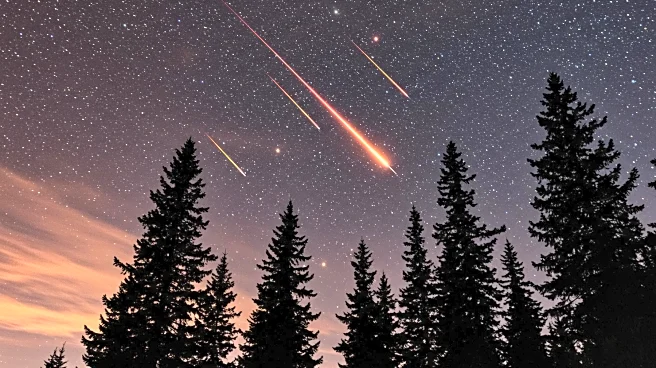What is the story about?
What's Happening?
Residents in the Pacific Northwest observed a fireball streaking across the sky earlier this week. The American Meteor Society confirmed the sighting, noting that the fireball appeared in Eugene, Oregon, at 10:10 p.m. on Wednesday. The phenomenon was visible in various locations across Oregon and Washington, including Grants Pass, Ashland, and Ridgefield. A video shared by a Eugene resident captured the fireball's glittering trail before it dispersed. According to Jim Todd, Director of Space Science Education at the Oregon Museum of Science and Industry, the fireball could have been a meteor or space debris. NASA describes fireballs as bright meteors caused by objects measuring at least one meter. Todd explained that fireballs result from space rocks entering the Earth's atmosphere, where they are slowed and heated by friction. The sighting coincided with the peak of the Perseid meteor shower, which is caused by debris from the comet Swift-Tuttle. Additionally, SpaceX launched its Falcon 9 rocket on the same day, which may have contributed to the fireball if the rocket's second stage did not deorbit as planned.
Why It's Important?
The sighting of the fireball is significant as it highlights the ongoing interaction between space objects and Earth's atmosphere. Such events can provide valuable data for scientists studying meteors and space debris. The occurrence also underscores the importance of monitoring space activities, such as satellite launches, which can inadvertently contribute to atmospheric phenomena. For the public, witnessing a fireball can spark interest in astronomy and space science, potentially encouraging educational pursuits in these fields. The event also serves as a reminder of the vastness and unpredictability of space, prompting discussions on space exploration and the need for responsible management of space debris.
What's Next?
Future observations and analyses by organizations like the American Meteor Society and NASA will continue to track and study fireballs and other atmospheric phenomena. Space agencies may review and refine deorbit procedures for rockets to minimize unintended atmospheric entries. Public interest in space events may lead to increased participation in meteor watching and astronomy-related activities. Educational institutions might leverage such occurrences to promote science education and awareness. Additionally, discussions on space debris management could gain traction, influencing policy and research in space exploration and environmental protection.

















